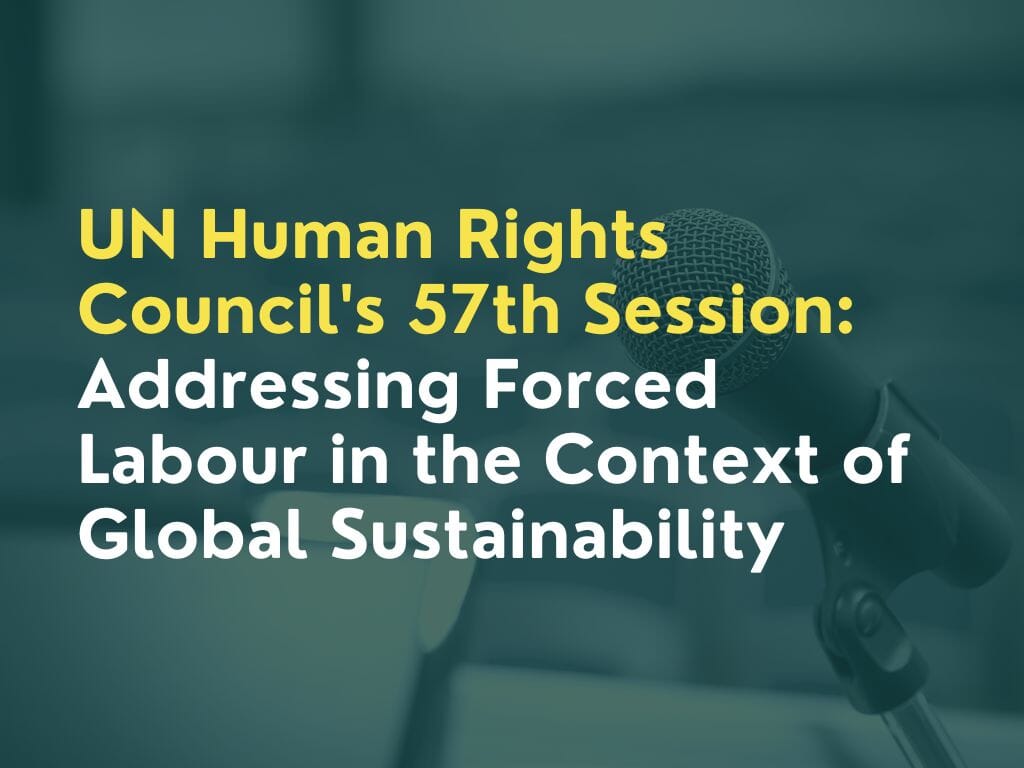
UN Human Rights Council’s 57th Session: Addressing Forced Labour in the Context of Global Sustainability
September 25, 2024
The United Nations Human Rights Council is holding its 57th regular session between 09 September and 11 October 2024 at the Palais des Nations in Geneva, with a spotlight on critical human rights issues and forced labour concerns. This conference coincides with the UN Summit of the Future, highlighting the interconnectedness of human rights and sustainable development.
While the Council addresses a broad spectrum of human rights issues, the ongoing struggle against forced labour remains a critical focus. This aligns with the wider goals of the UN's Sustainable Development Agenda, particularly SDG 8 on decent work and economic growth.
The International Labour Organization estimates that 27.6 million people are subjected to forced labour globally. This staggering figure shows the magnitude of the challenge and the urgent need for concerted action. Recent years have seen significant regulatory advancements aimed at combating forced labour. For example, the European Union's Forced Labour Regulation (EUFLR) and the Corporate Sustainability Due Diligence Directive (CSDDD) are reshaping the landscape of due diligence, placing increased responsibility on businesses to ensure their supply chains are free from exploitation.
The recent UN Summit of the Future, held on 22 - 23 September 2024, provided crucial context for the Human Rights Council's discussions on forced labour. The Summit's adoption of the Pact for the Future, which includes a Global Digital Compact and a Declaration on Future Generations, has significant implications for the fight against forced labour.
Key Commitments from the UN's Pact for the Future
- Eradicating Forced Labor: The Pact explicitly commits to "intensify international, regional and national efforts to take immediate and effective measures to eradicate forced labour, end modern slavery and trafficking in persons, especially women and children, and eliminate all forms of child labour."
- Human Rights Protection: The Pact reaffirms the commitment to respect, protect, and promote all human rights and fundamental freedoms, including civil, political, economic, social, and cultural rights.
- Gender Equality: The Pact emphasises the need to "take bold, ambitious, accelerated, just and transformative actions to ensure the full and equal enjoyment of all human rights and fundamental freedoms by all women and girls." This includes protection from exploitation and forced labour.
- Youth Empowerment: The Declaration on Future Generations includes commitments to meaningful youth participation in decision-making, which can contribute to policies that prevent youth exploitation and forced labour.
- Digital Cooperation: The Global Digital Compact, part of the Pact, offers new avenues for combating forced labour through improved connectivity and digital tools for monitoring and reporting labour abuses.
- Economic Inclusion: The Pact calls for "equitable and meaningful inclusion in the digital economy" and support for micro-, small- and medium-sized enterprises to access and compete in the digital economy, which can help reduce vulnerability to forced labour.
As the global community gathers to address these challenges, TDi Sustainability continues to play a crucial role in helping businesses navigate the complex terrain of forced labour prevention and mitigation. Our approach aligns with the goals outlined in both the Human Rights Council session and the Summit of the Future:
- Risk Assessment and Mitigation: TDi conducts in-depth analyses of value chains to identify potential forced labour hotspots and develop customised mitigation strategies.
- Capacity Building: Our tailored workshops and policy guidance help organisations build a strong foundation for addressing forced labour risks, aligning with the Summit's call for enhanced global cooperation.
- Digital Solutions: Leveraging the essence of the Global Digital Compact, we incorporate advanced digital tools in our risk assessment and monitoring tools for our clients.
- Reporting and Transparency: We assist businesses in meeting modern slavery reporting requirements, contributing to the broader goal of corporate accountability emphasised in the Pact for the Future.
- Future-Focused Strategies: Our approach considers long-term sustainability, aligning with the Declaration on Future Generations by embedding human rights considerations into ESG strategies.
The Council's focus on forced labour and the forward-looking commitments of the Summit of the Future presents a unique opportunity. It calls for innovative solutions, stronger collaborations, and unwavering commitment from all stakeholders to create a world where forced labour is eradicated, and decent work and economic growth are realities for all. TDi Sustainability remains committed to supporting businesses in their journey towards ethical and sustainable practices. By providing comprehensive human rights due diligence services and staying aligned with global initiatives, we aim to contribute to the eradication of forced labour.
Watch the TDi Webinar: Forced Labour - Risks and Regulations
To further support businesses in their efforts to combat forced labour, TDi Sustainability hosted a webinar on 01 October 2024 featuring experts James Hollins, Head of Data and Due Diligence, and Sunil Abeyasekera, ESG Consultant, who delved into the complexities of forced labour, discuss the latest regulations, and showcase effective monitoring tools.
The webinar explored:
- The nature and scope of forced labour in global supply chains
- Key risk areas and underlying causes
- Latest regulatory developments, including the EUFLR and CSDDD
- Practical strategies for identifying and mitigating forced labour risks
- Case studies highlighting challenges and best practices